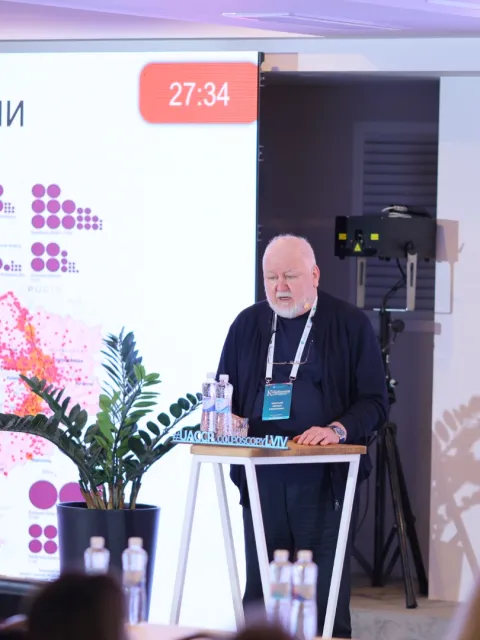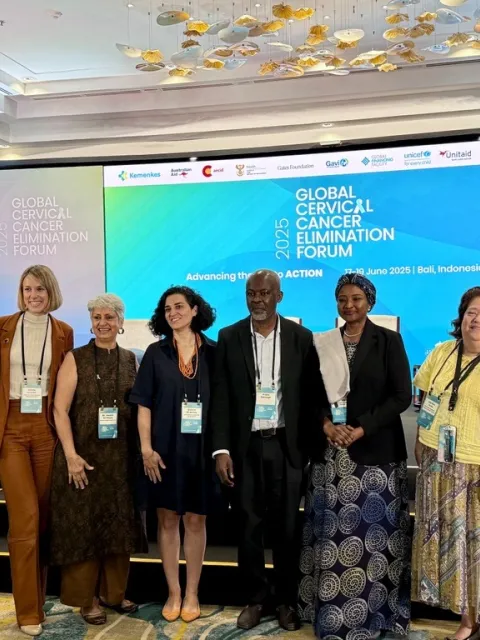Bringing cervical cancer prevention to remote populations in Guatemala
The SUCCESS project and work by civil society in Guatemala together with government authorities are making great strides towards achieving the targets laid out in WHO's Global Strategy to eliminate cervical cancer.

During the month of November, UICC has published a series of articles on cervical cancer elimination, in light of the first anniversary of the launch of the Global Strategy.
This article showcases progress and activities in Guatemala, one of the four countries supported by the SUCCESS (Scale-up Cervical Cancer Elimination with Secondary prevention Strategy) project. Secondary prevention refers to the screening and treatment of precancerous lesions, allowing for early detection of potential cancers and therefore more effective treatment.
The progress in Burkina Faso and Côte d’Ivoire (Ivory Coast), two of the other countries supported, was highlighted earlier this month.
SUCCESS, funded by Unitaid and led by Expertise France in collaboration with Jhpiego and UICC, aims to support Burkina Faso, Côte d’Ivoire, the Philippines and Guatemala in scaling up their actions to achieve the targets set out in the WHO Global Strategy to eliminate cervical cancer, which was officially launched by WHO on 17 November 2020.
The '90-70-90' targets for 2030 include vaccinating 90% of girls by age 15 against human papillomavirus (HPV), which contributes to more than 70% of all cervical cancer cases; screening 70% of women by age 35 and again by age 45 with a high-performance test; and providing adequate treatment to at least 90% of those diagnosed with cervical cancer.
Scaling up secondary prevention with the SUCCESS project
The first 50 women who were screened for HPV in Guatemala through the SUCCESS programme live in Nebaj, an isolated community located in the western highlands with a traditional ethnic history.
This screening was carried out as part of a demonstration training in June 2021 with 11 traditional midwives and 15 female volunteers as well as community health workers responsible for encouraging participation in health facilities and programmes. Further training on HPV screening took place in September and is now ongoing. It will soon be carried out in 10 departments and 19 districts.
Building on these training and demonstration projects, the Ministry of Public Health and Social Assistance (Ministerio de Salud Pública y Asistencia Social or MSPA) officially launched the SUCCESS project through a series of discussions, presentations and events on 17 November 2021, bringing together key stakeholders who will ensure successful implementation and future scale-up of services.
Also announced on 17 November 2021 was a national virtual cervical cancer prevention training course, to which SUCCESS has contributed with the development and technical support of training modules.
At the request of the MSPAS, all staff from the project sites where SUCCESS is operating will complete this first virtual phase of the course and will be followed by in-person training on visual inspection of cervix with acetic acid (VIA) and thermal ablation, an alternative form of treatment for precancerous lesions that is more economical and easier for providers to use than cryotherapy.
"A comprehensive cervical cancer prevention strategy combines vaccines, screening and thermocoagulation along with the support of trained and caring staff. When modern technology is available, such as DNA/HPV screening, then we have to find a way for the health system to have access to these screening protocols in order for all women to benefit."
– Dr Mirna Montenegro Rangel, President of the Organisation for Women's Health and Development (Instancia por la Salud y el Desarrollo de las Mujeres or ISDM)
Cryotherapy is currently available in higher-level primary care health facilities for women in need of treatment. Now, however, through the SUCCESS project, women in 19 districts will have access to thermal ablation through the SUCCESS project. Women who are found to need LEEP or biopsy treatment will be referred to existing hospitals and those sites that SUCCESS newly supports.
SUCCESS and the MSPAS will be receiving and distributing additional HPV self-sampling tests via the central system, while ensuring that test results are available to health centres.
Finally, the project will also be practically supporting follow-up with patients, as this is a big challenge for many areas in Guatemala. To ensure that the population is aware of the opportunity provided through the project for screening and treatment, SUCCESS will also be working with partners to develop a communication plan and materials to assist organisations in raising awareness and generating demand.
Civil society actions for improving secondary prevention of cervical cancer
Last year, Dr Amelia Flores, then Minister of Health of Guatemala, and Sofia Hernandez, Vice President of the Congress of the Republic, officially declared that Guatemala was joining the Global Strategy to eliminate cervical cancer.
The UICC member organisation ISDM (Instancia por la Salud y el Desarrollo de las Mujeres or Organisation for Women's Health and Development) works on sexual and reproductive health and has been deeply involved in cervical cancer control, running awareness-raising campaigns, conducting social audits, and piloting HPV testing through the PATH project, Scale-Up, and successfully lobbying for an HPV vaccination programme for girls aged 10 to 14.
"Due to COVID, the HPV vaccination strategy within the school system was postponed. Girls, however, need to start or complete their scheduled vaccines as soon as possible. The HPV vaccine should be offered in all services on demand."
– Dr Mirna Montenegro Rangel, President of the Organisation for Women's Health and Development (Instancia por la Salud y el Desarrollo de las Mujeres or ISDM)
ISDM is also part of and closely collaborates with the Technical Advisory Group on Cervical Cancer (Grupo técnico asesor de cáncer cervicouterino) at the Ministry of Health that is working towards achieving the WHO targets for elimination and on the implementation of Guatemala’s national plan for prevention, control and management of cervical cancer.
The work of ISDM was further strengthened this year by the adoption of a 2021 work plan for the Cervical Cancer Technical Working Group and the formation of sub-commissions on advocacy, scientific evidence and communications. According to ISDM President, Dr Mirna Montenegro Rangel, technical work in coordination with the National Reproductive Health Programme has led to the publication of updated treatment guidelines for self-sampling HPV DNA tests and the treatment of pre-cancerous lesions using thermoablation.
“In 2021 since the launch of the Global Strategy, we have seen significant progress in training and certification of approximately 350 health providers for VIA (visual inspection with acetic acid), monitored by ISDM.”
– Dr Mirna Montenegro Rangel, President of the Organisation for Women's Health and Development (Instancia por la Salud y el Desarrollo de las Mujeres or ISDM)
Dr Montenegro Rangel says that ISDM aims to decentralise the work of several departments and increase the voice of patient organisations. In 2022 and beyond, it will continue to improve access to HPV vaccination of girls, HPV testing and thermal ablation for women who need it.
Last update
Thursday 02 December 2021
